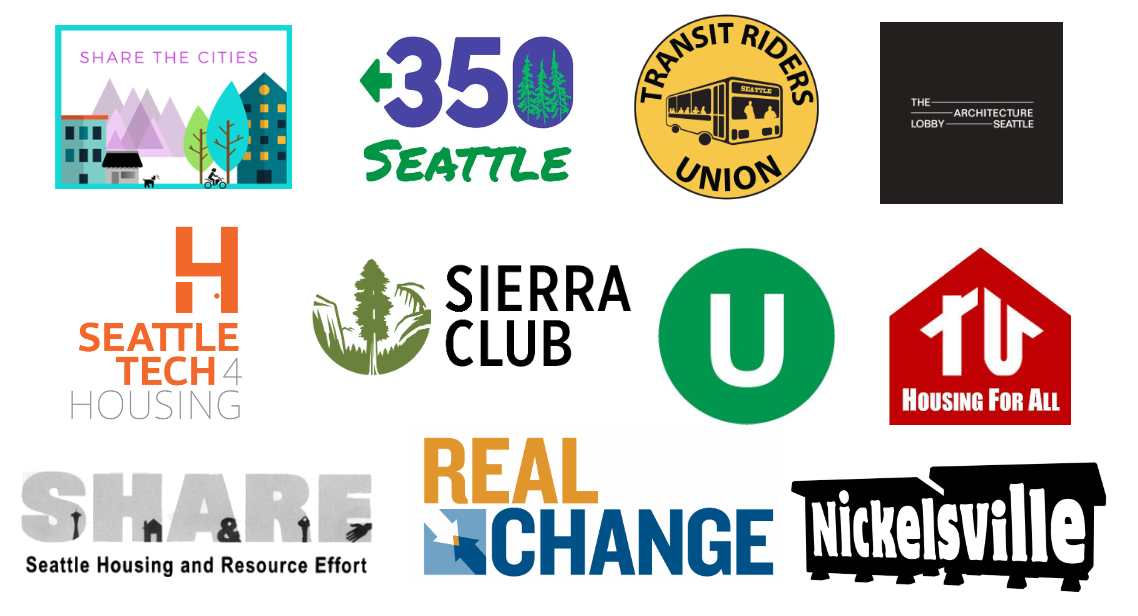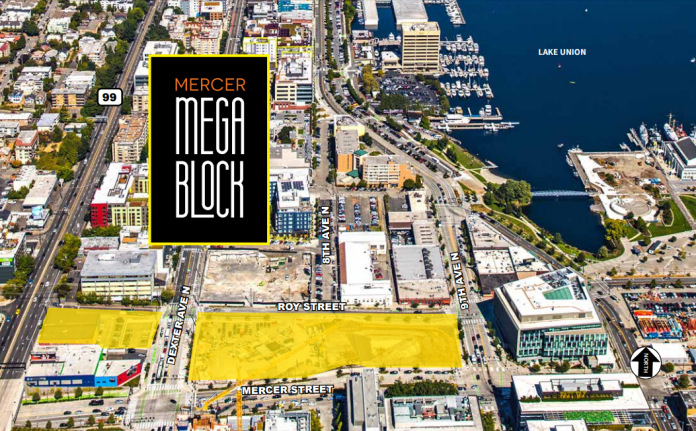Public land is owned by all of us. City government acts as its steward, ensuring it is managed in the public interest, to benefit the residents of Seattle. When a City department determines property in its care is no longer needed, the City’s duty is to determine the most beneficial alternative use.
The City of Seattle owns nearly three acres of land in South Lake Union it no longer “needs.” While obligated to reimburse the Washington State Department of Transportation (WSDOT) for funds contributed to purchase the land years ago, City government is largely free to use this land, called the Mercer Mega Block, in a way that would best meet our needs.
Our city is experiencing a devastating affordable housing crisis. Rents are well out of reach for most of us. Low-income working people are losing housing and falling into homelessness, because there simply are not enough apartments they can afford. Our neighbors are being displaced as prices rise across the city, with communities of color, immigrant communities and young people hit hardest by gentrification. There is little or no housing in South Lake Union affordable to the low-wage janitors, security officers, and food service workers who work in the neighborhood. These employees are forced into long commutes to remote suburbs where they can find more affordable rents, separated from their families and wasting time in congested traffic.
There is a new 2018 Washington State law that offers a bold solution to exactly this problem. It allows the City of Seattle (or any public agency) to transfer surplus public property at zero cost for the purpose of developing affordable housing. The Mercer property in South Lake Union provides a terrific opportunity to take advantage of this solution.
Instead, the City of Seattle is quietly selling off this public land for development of luxury housing or high-end office space. The Request For Proposal (RFP) states that over 1300 apartments could be built on this site, and only “suggests” private developers include 175 affordable units among them. Why suggest such a low number of affordable units–only 13%–given the many thousands of homes needed for workers, low-income households, and people experiencing homelessness?
We can do better than this! We request that the City of Seattle rip up the current RFP and rethink this process. We have new legislation coming soon that will dictate that the City prioritize affordable housing on any surplus land. How can we use this opportunity to create stable affordable housing for those who are being crushed by our overheated economy? The City should invite the public to join in a creative and bold discussion of how best to reuse this property that we collectively own. There are better alternatives than the current RFP, for example:
- Issue a new RFP requiring at least 40% of the developable capacity be used for a mix of low-income and workforce housing. Judge proposals based on which will create the most affordable housing, and require the winning bidder to guarantee the commitment.
- Only sell off the minimum amount of land necessary to repay the WSDOT debt, and make the rest of the site available to a non-profit or public housing developer at zero cost.
- Consider a long-term lease that would directly contribute tens of millions of dollars for affordable housing and equitable development, a revenue stream that could fund non-profit projects for decades.
- Empower an established Public Development Authority (e.g. Capitol Hill Housing, SCIDpda) to take ownership of the site and develop a project that is fully in the public interest, and accountable to the folks that will live there. They are experts; why not use their expertise and their authority to develop this land for public good?
In any path forward, the City should require Community Workforce Agreements and Labor Harmony Agreements. Seattle’s commitment to an equitable, just city should extend beyond the use of public land, to include good jobs for the workers who build there and for those who work in the buildings that are built.
This is a huge opportunity. We need to figure out the most creative solution that will builds hundreds of affordable apartments for people who work in South Lake Union but can’t afford to live there. Let’s take a giant step toward being a more inclusive, diverse and welcoming city where everyone can thrive.

Endorsed by: Share The Cities; Seattle Architecture Lobby; 350 Seattle; Sierra Club Seattle Group; Transit Riders Union; Seattle Tech 4 Housing; The Urbanist; Tenants Union of Washington State; SHARE (Seattle Housing and Resource Effort); WHEEL (Women’s Housing Equality and Enhancement League); Nickelsville; Real Change; Cary Moon; Mike Eliason; Professor Sara Rankin, Director, Homeless Rights Advocacy Project.


